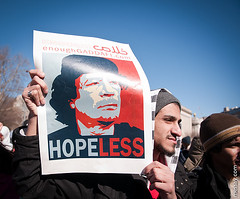 Image by Crethi Plethi A February 22, 2011 press release by the Department of Foreign Affairs
Image by Crethi Plethi A February 22, 2011 press release by the Department of Foreign AffairsThe Philippine Embassy in Tripoli has raised its alert level and is making arrangements to repatriate Filipinos in Libya who wish to come home in light of protest actions in the country.
In a press conference today, Foreign Affairs Undersecretary Esteban B. Conejos said that in light of recent events, the alert level in Libya was raised to alert level 3—voluntary repatriation.
For Filipinos in Tripoli who wish to avail of voluntary repatriation, they are advised to call the Embassy or community coordinators in their area. They are asked remain indoors and not go out alone in the streets.
Those in Benghazi, Al-Baida and other areas are similarly asked to communicate with their sectoral coordinators. They are also advised to stay put and not venture outdoors alone.
If their companies have repatriation arrangements, they are advised to join said repatriation efforts.
The Embassy officials and community coordinators are contacting the Filipinos in Libya to inquire about their condition and inform them of the Embassy’s voluntary repatriation program.
The Department of Foreign Affairs (DFA) dispatched a quick response team from its Office of the Undersecretary for Migrant Workers Affairs (OUMWA) to Libya to augment the Embassy staff. The team, which departs Tuesday evening, is composed of DFA-OUMWA Executive Director Ricardo Endaya and two other staff.
The DFA also made available an additional US$50,000 to the Embassy, and will further augment it with US$100,000 for the voluntary repatriation program. The Departrment of Labor and Employment has also committed P25 million to assist in the program.
The DFA activated a 24-hour hotline number for families of Filipinos based in Libya. The hotline number is 834-4580.
Undersecretary Conejos added that the DFA has made arrangements with the International Organization for Migration (IOM) for the latter’s aid in the repatriation of Filipinos. The Embassy is also in touch with the IOM office in Libya.
There are around 30,000 Filipinos in Libya—15,000 in Tripoli, 10,000 in Benghazi and Al-Baida areas and 5,000 scattered in other parts of the country. Majority of them are professionals, skilled and semi-skilled workers.
In addition to fresh violence in several cities, heavy gunfire also broke out in downtown Tripoli for the first time since the uprising began a week ago.






No comments:
Post a Comment